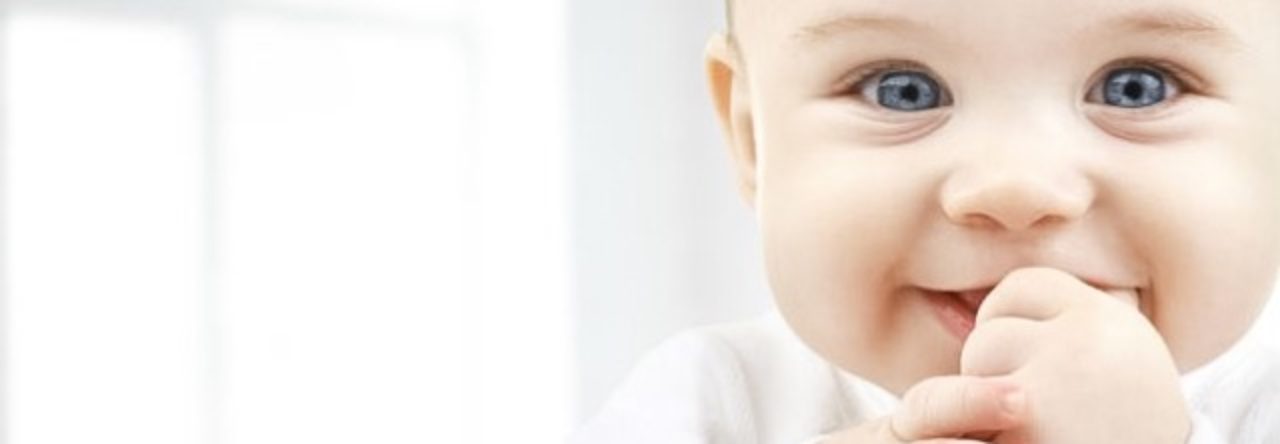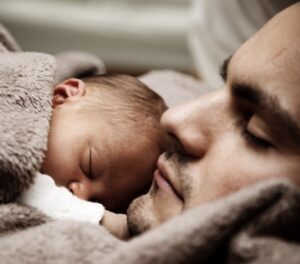
30% of couples infertility is due to female factors, 30 to 50% are due to male factors, 20% are due to a combination of male and female factors, and the remaining 20 to 30% are undetermined, also known as Functional Infertility. In order for fertilization to take place, both the male and female factors need to be considered.
The most common causes of infertility in women fall into the following three categories: Ovulatory disorders where ovulation is irregular and often unpredictable, or there is no ovulation at all. Tubal disorders where there are blocked or infected Fallopian tubes, and Uterine issues such as fibroids, polyps or adhesions.
The most common causes of male infertility are low numbers of sperm, decreased or ineffective motility (movement) of sperm cells, high numbers of improperly shaped sperm cells, and complete lack of sperm in the ejaculate.
Acupuncture and Traditional Chinese Medicine (TCM) reduce the time it takes to become pregnant, in addition to optimizing your reproductive health for a healthy pregnancy. This is done by optimizing the uterine environment for implantation and gestation by balancing reproductive hormones, improving the blood and “Qi” flow to the reproductive organs, and by correcting imbalances in the energy “meridians” that connect throughout your body.
For women conceiving later in life, it becomes more of a challenge as the supply of eggs decreases, along with some quality. TCM is a good match for women who are having a baby later in life. By optimizing reproductive potential, the chances of conceiving and delivering a healthy baby by significantly increased. TCM smooths out the gears of reproduction, making conception and gestation healthier and easier for your body.
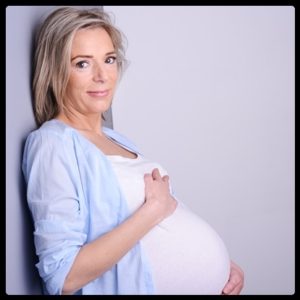
The New England Journal of Medicine has reported that Acupuncture can increase the incidence of a successful pregnancy by about 50%. If you feel that time is a factor or that getting pregnant is taking too long, Traditional Chinese Medicine can be especially helpful for you. TCM/Acupuncture treatments have been demonstrated to increase the number of follicles and the quality of eggs within them, and the incidence of successful fertilization, have been shown to decrease blockages in the Fallopian tubes, positively effect hormonal balances, and reduce the inhibiting effects of stress.
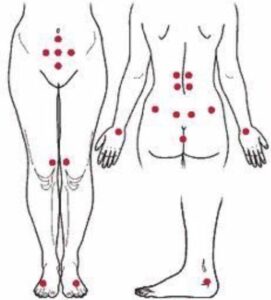
The above images illustrate some common points that are used to treat Infertility with Acupuncture. Depending on the TCM diagnosis associated with your infertility, I will commonly choose 4 to 8 of these points, along with other points on the legs and arms, head and ears.
Benefits of Acupuncture and other TCM Treatments:
Increased blood flow to the uterus and ovaries.
Clearing of blocked Fallopian tubes.
Improvement in the imbalances associated with PCOS.
Reduction of Uterine Fibroids, and blockages associated with Endometriosis.
Correction of Luteal Phase Defect.
Improvement of the lining of the uterus.
Improvement in the quantity and quality of follicles and eggs.
Reduction and management of stress and anxiety.
Decrease the incidence of miscarriage.
Increase in successful implantation followed by a healthy full-term birth.
Course of Treatment
The widely accepted criterion for a diagnosis of infertility is that of a couple who have been trying to conceive unsuccessfully for 12 months. For women over 35 this becomes 6 months. Within this population it requires on average a course of treatment to last from two to six cycles for successful conception in women who are not using Assisted Reproductive Technologies (ART). My experience with patients also undergoing ART is that on average they become pregnant within one to four cycles.
Ideally patients receive treatment once a week through the completion of the first trimester. Scheduling consistency is very important. The effects of Traditional Chinese Medical Treatment are cumulative. You should adhere to a regular schedule of treatment.
If your circumstances allow, I recommend continuing treatment until at least the twelfth week of pregnancy in order to maintain an optimal uterine environment and keep your stress and anxiety at a minimum and your health and that of your developing baby at it’s best. Some women choose to continue treatment into the second trimester. But usually women know when they are ready to discontinue treatments, when she feels secure in her pregnancy.
Stress and Infertility
It has been clearly demonstrated in humans that stress adversely effects fertility and blood flow to the uterus. Reduction of stress is directly related to successful fertilization, implantation, and the healthy development of your baby. This is a factor that many would-be mothers under-appreciate, but as Chinese Medicine has known for thousands of years, excessive stress can be the preventing factor to conception.
It’s an axiom that being an adult in modern society means being stressed. Chinese Medicine is particularly effective at reducing the stressful state of mind. Stress reduction is achieved during an Acupuncture treatment, but I recommend that patients make stress reduction a part of their daily lives. For more information on understanding and reducing stress, open the my page called “Fertility, Stress and Best Practices”.
It is not necessary (or even possible) to become free of stress, but by reducing your stress a couple times a day you are sending messages to your body that it is a good time to conceive and carry a baby. In a large federally funded study it was demonstrated that women who were trying to conceive that participated in stress-reduction had a 55% “take home baby rate” compared to 20% in women who did not participate.
Body Mass Index (BMI) and Fertility
Extremes of body weight affect fertility. It feels great to work out hard and physically you become strong and have reason to be proud of yourself. But ovulation shuts off at BMI’s below around 19, and a woman cannot become pregnant if she is not ovulating. If you are super trim and muscular, and you’re not having your period normally, or at all, it may be because your BMI is too low. Throughout the history and evolution of humankind, BMI’s below 19% indicate famine, and nature will take over to avoid having an at risk pregnancy. Low BMI is also associated with increased risk of miscarriage. To calculate your BMI, click here. If a client is a habitual extreme exerciser, it can be nearly impossible for her to change her exercise and dieting habits. This is a particular challenge. Exercise is undoubtedly very effective at reducing the experience of stress. Treatment through TCM techniques focuses on reducing the stress that women experience in their lives so that they can more comfortably reduce their exercise to a moderate level during the time that they are conceiving and having a baby.
At the other end of the spectrum, women with BMI’s in excess of 30 have a reduction of 50% in fertility. But it has been demonstrated that a weight loss of 5-10% is enough to significantly increase such an individual’s chances of conception and full term pregnancy, even though their BMI remains high. For example, a woman who is five foot 6 inches tall who weighs 260 pounds has a BMI of 42. If that woman was to lose 5%, or 13 pounds, her BMI would still be high at 40, but through weight loss she has signaled to her body healthier behaviors, resulting in an increased chance of becoming pregnant. And acupuncture can help with weight loss.
Acupuncture Support for the Western Medical Treatment of Infertility
TCM works especially well as an adjunct to the Assisted Reproductive Techniques (ART) employed by Western Medicine. Consistent acupuncture treatments leading up to and following Assisted Reproductive Techniques help to regulate hormones, optimize conditions for implantation, and support conditions so that your baby can thrive. These ART techniques include In-Vitro Fertilization (IVF), Intra-Uterine Insemination (IUI), Gamete Intrafallopian Transfer (GIFT), Zygote Intrafallopian Transfer (ZIFT), and Intracytoplasmic Sperm Injection (ICSI). TCM prepares a woman’s body to be optimally receptive during these procedures by correcting imbalances, reducing stress and clearing blockages.
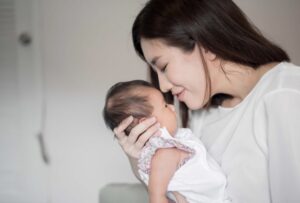
In Vitro Fertilization (IVF) is a process by which an egg is fertilized by sperm outside the body. The process includes stimulating the development of mature follicles within the Ovaries, retrieving eggs from the mature follicles and having sperm fertilize the harvested eggs in a laboratory setting. The fertilized eggs are then cultured and allowed to grow for a determined number of days, are transferred “fresh”, or are frozen and then later thawed and transferred into a woman’s uterus.
Intra-Uterine Insemination (IUI) is the process of injecting filtered sperm from the donor father into the uterus shortly before ovulation, to achieve fertilization in a process that involves less technology and is closer to natural.
Zygote and Gamete Intrafallopian Transfer ZIFT and GIFT are other forms of Assisted Reproductive Technologies that share some aspects of IVF. GIFT is the process whereby an egg and filtered sperm are mixed and injected into the Fallopian tubes, where fertilization naturally occurs. ZIFT is the process of placing a fertilized egg in the Fallopian tube where it will continue dividing as it migrates down to where implatation takes place.
Intracytoplasmic Sperm Injection (ICSI), often used when sperm cells have difficulties with number, motility or form, is a form of IVF but instead of surrounding an egg cell with suitable candidate sperm cells in a petri dish, a solitary sperm cell is selected and injected into a solitary egg cell. The fertilized egg is then eventually transferred back into the uterus or.
Scientific research papers on the effects of acupuncture as support when IVF is used continue to be published. But the seminal Landmark German Study in 2002 by Wolfgang E. Paulus got the ball rolling. It compared the pregnancy rates of two groups of women undergoing IVF. The group receiving acupuncture before, and after embryo transfer had a pregnancy rate of 42.5% compared to 26% for the non-acupuncture group.
Ways patients undergoing ART procedures can benefit from TCM:
Increased blood flow to the uterus and ovaries.
Improvement of the lining of the uterus.
Regulation of fertility hormones that improves the quality and quantity of follicles and eggs.
Reduction in the unwanted symptoms of IVF and the medications used.
Reduction in the stress leading up to and surrounding the transfer.
Decrease in the chance of miscarriage.
Increase in the chance of a successful implantation and a healthy full-term birth.
Reduction of post-transfer uterine contractions.
For general information on the use of Acupuncture to Treat Infertility, see this article published by WebMD.
For a nice summary of the efficacy of Acupuncture for treating Infertility, this article published by the Pacific College of Oriental Medicine in April of 2015 is an excellent introduction.
Resolve is a National Organization that is dedicated to support in the treatment of infertility. Resolve is an excellent resource and has information on support and advice groups local to your area.
If you have questions please Contact Us and I’ll get back to you. ( :
